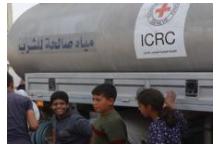Humanitarian needs are rising at a pace far beyond the world’s ability to respond. In 2025, we identified 383 armed groups of humanitarian concern operating across more than 60 countries—an unprecedented fragmentation of violence that is placing millions of civilians at risk.
The consequences are devastating. Essential services are collapsing. Families are losing reliable access to electricity, water, health care and education. Weapon contamination threatens daily life, making even routine activities—walking to school, farming, collecting firewood or gathering water—dangerous. Repeated displacement, family separation and sudden shifts in control or violence have become part of everyday reality for far too many people.
Conflicts are spreading across continents, breaking into smaller and more volatile confrontations, and exposing civilians to levels of danger not seen in decades. At the same time, humanitarian organizations are being asked to operate across wider, more unstable and complex environments with fewer resources. In this context, principled, neutral and well-supported humanitarian action is more essential than ever.
The International Committee of the Red Cross works in more than 90 countries, alongside the staff and volunteers of the International Red Cross and Red Crescent Movement. Every day, our teams bear witness to the horrors of war, advocate for the protections envisioned under international humanitarian law and work to ease the suffering of those affected. We are often present in places that are hard to reach or where few, if any, humanitarian actors can operate.
In 2026, we will continue to promote the protection of people affected by armed conflict and other situations of violence and provide them with assistance. In contexts such as Israel and the occupied territories, Sudan, Ukraine and Yemen, we will keep engaging with all parties to facilitate safe transfers, family reunification, the evacuation of wounded people and the dignified return of the deceased.
This is the essence of our protection mandate. Because we are neutral, impartial and independent, we can maintain dialogue with all sides to a conflict and reach people in areas that receive little global attention. Our work is not a collection of isolated activities; protection, assistance and prevention are interconnected, allowing us to meet urgent needs while reducing harm, preserving dignity and maintaining access in volatile environments. Close cooperation with National Societies ensures that this support reaches communities quickly and safely, while flexible funding allows us to adapt as situations evolve.
Your support enables the International Committee of the Red Cross to:
• stay present in the world’s hardest‑to‑reach places
• protect civilians under fire through confidential dialogue
• restore essential systems such as water, electricity and medical services
• help families search for missing relatives
• ensure the dignified recovery and identification of the deceased
• strengthen National Societies who are first to respond when crises escalate
For 160 years, the International Committee of the Red Cross has been a lifeline for people affected by conflict. Our mission is as vital today as at any point in its history. To continue meeting the needs of millions of people caught in armed conflict, we rely on strong donor support—especially in a moment of profound financial uncertainty across the humanitarian sector.
Early, flexible, predictable and sustained contributions are essential for us to fulfil our mandate and remain present for the communities that depend on us.
